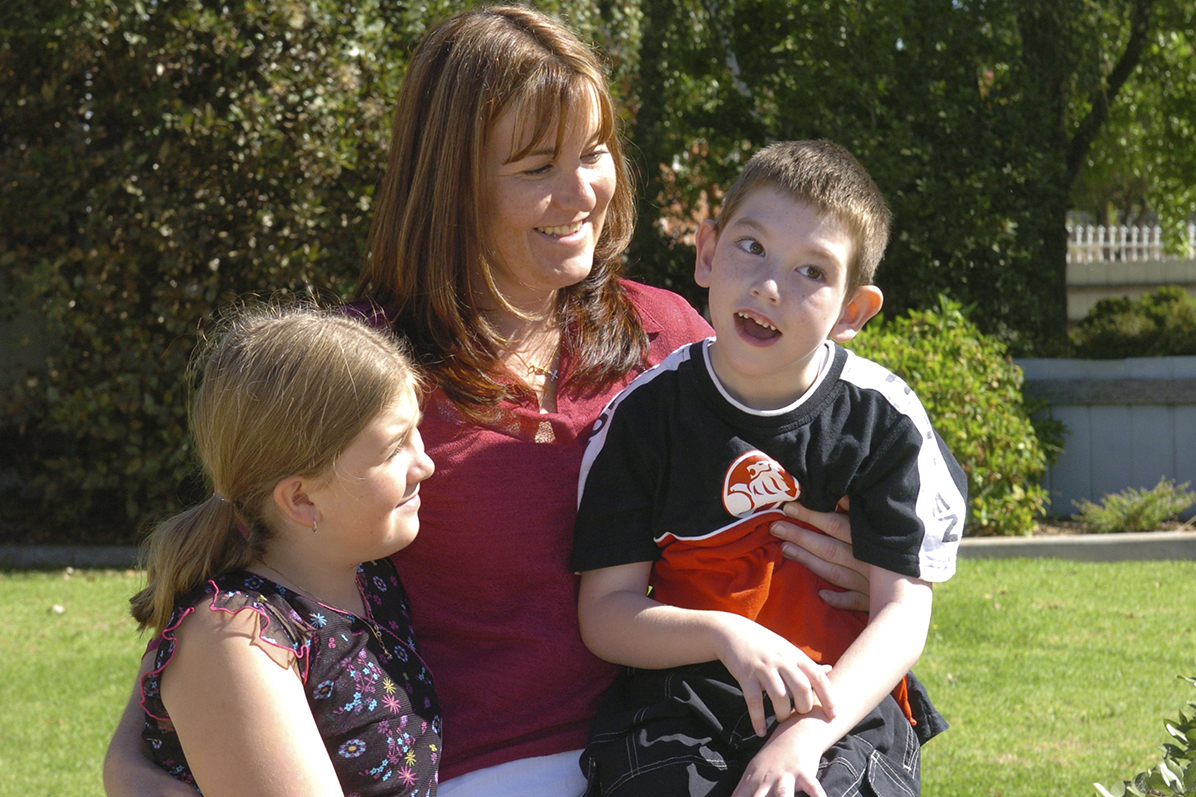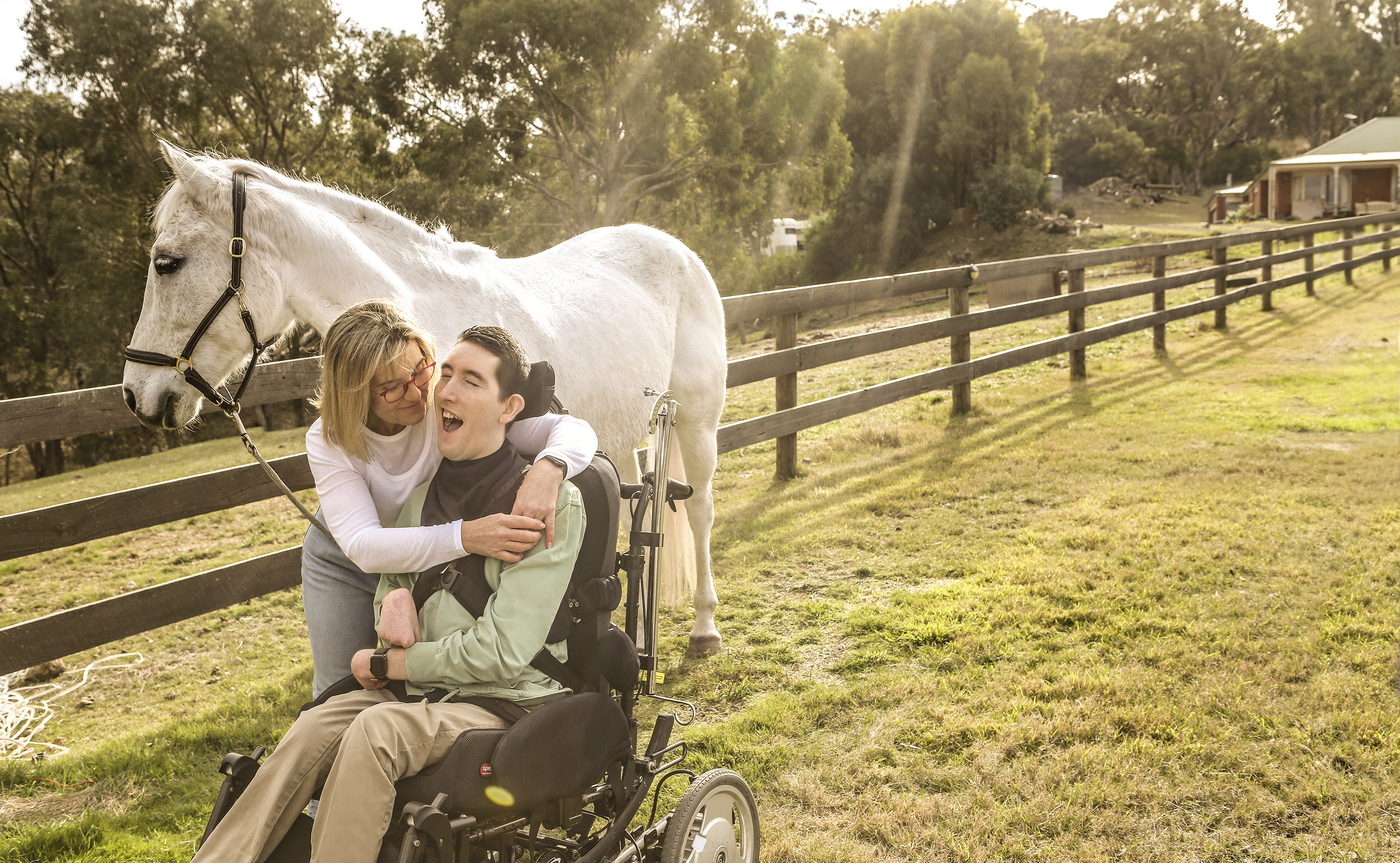It took just a minute or two for Debby Fraumano’s life to pivot 180 degrees. She was 26 years old, in a hospital maternity unit, giving birth to her son. Debby was already a young mum to three-year-old Saoirse, who had been given her beautiful Irish name because she’d been conceived while Debby and her husband were living and working in Ireland.
They’d returned to Australia and settled in the Latrobe Valley, east of Melbourne, not far from where Debby had grown up. After Saoirse was born, Debby had gone back to work part-time, supporting vulnerable families and children at risk. Life felt rewarding and the future looked bright. On weekends she loved to ride. “I’ve been a horse girl all my life,” she says.
There was nothing about Debby’s pregnancy with her second child, Michael, that gave her a moment’s pause. And when she went into labour she expected an uncomplicated delivery, but that wasn’t to be.
“The cord was wrapped around Michael’s neck a couple of times and it was a traumatic birth,” she tells The Weekly. “When they finally were able to get him out, he didn’t have a heartbeat and wasn’t breathing. They had to revive him. Those minutes of no oxygen caused brain damage and cerebral palsy.”

Michael has spastic quadriplegia, the most severe form of cerebral palsy, which affects all four limbs. The full implications of his condition took a little while to become evident but, Debby adds, “I knew when I had him – with the complexity of his disability, his needs and the demands of caring for him, even as an infant – that I wasn’t going back to work for a very long time.”
Every week in Australia, 2.65 million people work an average of 36 hours (but sometimes as many as 104 hours) to support a friend, relative or neighbour who needs their care. Seven out of 10 unpaid carers are women who make immense emotional, career and financial sacrifices to look after people they love. Like Debby, their lives can pivot in an instant – it could be an accident, a stroke, the onset of a mental illness, the needs of an ageing relative or the birth of a child with a disability – and suddenly, vast tracts of their life are put on hold.

Debby had a year of maternity leave, but then she had to resign from her part-time job because caring for Michael was all-consuming. There were weekly physio, occupational therapy and paediatric appointments. He hit a particularly rough patch not long before his second birthday and his care became even more challenging.
“He was failing to thrive,” Debby explains. “He had a lot of difficulty around eating enough nutrition and getting enough water for hydration. They finally put in a PEG [a feeding tube that’s surgically inserted in the stomach] and that made a big difference.
“But those first few years were difficult. And my husband and I separated just before Michael’s second birthday, so I was a single parent very early on. I remember, at the turn of the millennium, New Year’s Eve, thinking: ‘Here I am, 28, two young kids and, you know, just struggling to survive’.”

In some ways, Debby was lucky. Her father bought a house which she was able to rent from him and alter as required – with hoists and rails and ramps. Many carers can’t do that. She was also able to find a place for Michael in day care and then in a specialist school, so she could return to university – just one day a week at first – and then go back to part-time work.
Even so, the financial burden has been heavy. And the sacrifices that unpaid carers make stay with them all through their lives. That’s why Debby is speaking out now – to support a campaign by Carers Australia and Are Media (The Weekly’s parent company) to have superannuation added to carers’ income support.
While they’re out of the workforce unpaid carers can receive means-tested income support (currently $1096.70 per fortnight, or $826 if the person being cared for is also on a pension), but it doesn’t replace a lost career or a full-time wage. And it doesn’t include superannuation, which means carers face precarious situations in retirement.
The average length of time an unpaid carer is out of the workforce is 11.5 years, but it can be much longer. “It can be a lifelong commitment,” says Annabel Reid, CEO of Carers Australia. “We also know that 25 per cent of unpaid carers are caring for two people or more. And another about 20 per cent are caring for three people or more. So it can be a very significant responsibility.”

Even calculating from the 11.5-year average, those carers stand to lose $392,500 in earnings and $175,000 in superannuation. But Annabel says that when people are caring for longer periods, “that can really compound, so they’re losing something like $440,000 in superannuation and $940,000 in lifetime earnings. We’re talking about a really significant financial impact.”
“One of the biggest things that’s affected us financially is that I’ve never been able to work full-time,” Debby agrees. “In the early years, I wouldn’t have thought about superannuation because we were struggling to just get through day to day. There were points when we didn’t know how long Michael might live. So I wouldn’t think about the future because I didn’t know what it might look like.
“Even now, I don’t know what my super should look like. I don’t want to work that out because I would hate to do a comparison of if I didn’t have Michael and had been able to work full-time … but I know it would be very different.”
Debby can’t bring herself to plan for retirement, but she’s aware that “the ramifications will happen in 15 years’ time when I’m allowed to retire, and I don’t have the funds in there to live comfortably … let alone to keep caring for Michael”.

Fortunately, Annabel Reid has thought about Debby’s future, and the future of the 2.65 million unpaid carers like her around the country. Annabel believes that adding superannuation to carer support payments could be the difference between poverty and a comfortable retirement for families like Debby and Michael. It would also be a sign of respect for years of selfless and often highly skilled labour.
“Sometimes I imagine being recognised and valued for the many roles I’ve taken on as a carer,” Debby smiles and she reels some off: “Dietician, physiotherapist, speech therapist, OT, nurse, GP, cook, cleaner, personal care assistant and accountant.”
If Australian governments had to pay for all the unpaid carer hours through a scheme like My Aged Care or the National Disability Insurance Scheme, it would cost the country $77.9 billion per year (and that’s the figure for 2020 – it would be more now).
“The care economy would collapse without this unpaid and informal care that friends and family provide,” Annabel insists. “And last year’s Intergenerational Report was predicting that the care economy will probably double in the next 40 years to accommodate our ageing population. Carers will play an incredibly important role as part of that.”
Today, after 26 years of caring for Michael, Debby works part-time as the Adult Support Manager at Down Syndrome Victoria, manages a local all-abilities football team and rides her horses Murray and Cybil (she also has a mini horse, Ombué) whenever she can. She has a good support crew, but she is still Michael’s primary carer.
“Intellectually,” she says, “he’s very aware – very switched on – but physically, he isn’t able to do anything for himself. He’s non-verbal. He’s in a wheelchair. He doesn’t have any purposeful movement with his arms or his legs, so he needs full hoist transfers. He can’t be left unsupervised, so he needs 24/7 care. But other than that, he’s well and healthy, and he’s a good guy.”

The things that bring her the greatest joy are watching him out and about in their local community in regional Victoria, and hearing tales of his adventures with friends and carers who look after him while Debby is at work.
“He’s a really lovely person,” she says, with an affectionate smile. “He’s got a great personality. He is well-known in the community and one of the best things is being known as Michael’s mum. Seeing the joy he brings to other people. You know, when they see him and they’re like, ‘Oh, Michael, it’s really good to see you’. He’s part of his community, he’s well-loved, and that’s really great.
“I wouldn’t be who I am today if it wasn’t for Michael. He has really made me a better person. Just having to build that resilience and the coping mechanisms – it’s given me a lot of skills and strength. I wouldn’t be working in the field that I’m working in if it wasn’t for Michael. I don’t know what life would look like if I hadn’t had him. Who knows?”
The Australian Women’s Weekly is campaigning for the government to pay superannuation to carers to help them build a better financial future.
For more information, visit costofcaring.com.au.
Help us guarantee super for Australia’s unpaid carers
Australia’s unpaid carers are in crisis. It’s time to do something about it.










